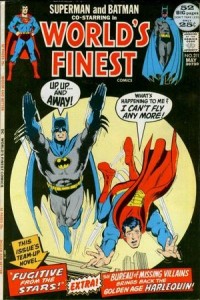The latest hearing in the Siegel family lawsuits has been scheduled for Tuesday, November 3 — but if you think this points to an undoing of their losses to this point, don’t get too excited.
At this point Marc Toberoff’s attempts to revive the Siegel case seem like the legal world’s version of trying to make fetch happen. To be sure, anything is possible in our judicial system — especially the 9th Circuit U.S. Court of Appeals — but the odds of success diminish significantly when you want to undo a lower court ruling expressly based on previous 9th Circuit decisions in the same lawsuits.
In this instance, Toberoff is arguing that although the court found that the 2001 settlement term sheet agreed to by the Siegels and DC was indeed a binding contract, the settlement itself didn’t actually transfer any rights. Toberoff is also trying to revive certain other last-minute arguments that, as I suggested at the time, the lower court found to have been waived. I’m not going to take us too deep into the legal thicket, but suffice it to say that the acrobatic verbal parsing and selective applications of precedent — let alone an attempt to argue once again that the term sheet really, no, really wasn’t a settlement no matter what the court said earlier – are not the sort of things that tend to find a sympathetic ear.
The oral argument scheduling for the day is another indicator that the lower court’s ruling for DC is not likely to be flipped. Appellate court oral argument schedules are often not accidental – there will be days that are essentially a series of more or less obligatory hearings, where the judges felt like the parties or a particular issue merit more than a summary disposition but the outcome is not too much in doubt. In this instance, the court slotted the various Siegel outstanding appeals (yes, there are more than one) for one short twenty-minute period after what appear to be easy cases involving, among other things, an attempt to reverse the conviction of a child pornographer caught literally with his pants down while molesting a ten-year-old. Again, scheduling is *not* determinative, but these are tea leaves that folks in the biz often read.
As for other issues on the merits in the Siegel lawsuits, one issue is particularly worth noting: DC’s own appeal of the district court’s rather unusual decision to amend its earlier summary judgment decision for DC with a ruling that the Siegels had indeed succeeded in terminating the Superman copyright even though they had previously agreed to sell it. The judge’s amendment comes across as a belated attempt at least to preserve the Siegels’ symbolic victory despite their substantive loss, but given the fact that the 2001 settlement rendered the termination filing invalid and rendered moot all subsequent rulings in the family’s favor, Toberoff’s sly attempt to find a backdoor basis to retain some claim to ownership is something that many, if not most appellate judges would tend to dismiss.
What’s more, as DC goes on to observe in a series of arguments to which folks interested in the scope of creators’ rights would do well to pay attention, not all of the original Superman material in Action Comics #1 was created by Siegel and Shuster. The work they sold was formatted as a set of black-and-white daily strips, but the formatting was undertaken by DC, just as the coloring was done by Jack Adler and DC’s other staff artists. Insofar as this additional work was performed at DC’s instance and expense, the company has a, well, colorable claim to co-ownership of anything that Siegels might at one point have been able to reclaim.
Why would DC’s work-for-hire argument here matter for anyone interested in the rights of individual creators themselves? The answer lies in a passage that DC quotes from Gaiman v. McFarlane: “The contents of a comic book are typically the joint work of four artists — the writer, the penciler[,] the inker[,] … and the colorist.” While in many instances a company may indeed be able to lay claim to the copyright in material produced by all such individuals as work made for hire, for original material whose copyright was first owned by its human authors there’s an argument here that the default co-owners of the copyright are not just the original writer and artist, but the inker and colorist as well. This raises the possibility of termination claims from creators and estates beyond those traditionally mentioned in comics cases, just as it could spark battles among individual creators who fail to sort out the rights at the start.
As noted above, none of this is to say that the Siegel family can’t or won’t win. However, a victory for the family would seem to require a degree of creative legal reasoning from the court that might very well be unprecedented.













Jeff,
Just a couple of points: If my memory is correct (and believe me a lot of time has passed so it could very well be wrong) but did not the Siegels first submit their Notices of Termination before they entered into the settlement term sheet? If so, that might explain the district court’s symbolic gesture of amending the judgment to find that the Siegels had successfully terminated the original grants to the Superman copyright. Second, if my memory is right, I believe DC filed a motion for reconsideration (following the district court’s March 2008 decision) making the colorization arguments you noted. The district court in 2008 rejected those arguments both on procedural grounds and on the merits.
Batmobile, hi!
Yes, the Siegels sent the notices prior to the settlement, but the validity of the notices was in dispute. Warner Bros. said they weren’t valid; the Siegels said they were. The settlement rendered the court’s subsequent lawsuit & rulings in regard to the termination moot; given the settlement, there wasn’t a live issue for the court to resolve.
Same goes for the issue of colorization – given the settlement, the issue shouldn’t have been before the court. Legally, it’s as if the 2008 ruling never existed.
That’s the Warner Bros. position, and if I were to bet where the case would end up, that’s where I’d place all my chips.
Comments are closed.